Back Bay Chorale muses on last things with new Fairouz work, Mozart Requiem

Mohammed Fairouz’s “Anything Can Happen” was heard in its Boston premiere Sunday, performed by the Back Bay Chorale.
“All changed, changed utterly.”…“Things fall apart; the center cannot hold.” These lines of W.B. Yeats echoed through the cataclysms of the twentieth century. And now comes another Irish poet, Seamus Heaney, with the poem “Anything Can Happen,” a first cousin of Yeats’s “The Second Coming,” a dark, plain-spoken meditation on end times with the events of September 11, 2001 as its backdrop.
Heaney’s poem is the namesake and centerpiece of a probing new choral work by the 27-year-old Arab-American composer Mohammed Fairouz, which received its Boston premiere in Harvard University’s Sanders Theatre Sunday afternoon.
The Back Bay Chorale—which commissioned Fairouz’s Anything Can Happen along with Boston University’s Marsh Chapel Choir, Cantori New York, and the Grinnell Singers at Grinnell College in Iowa—was led by its music director Scott Allen Jarrett. The only other performers on the theater’s wide stage for the Fairouz work were violist Roger Tapping and bass soloist David Kravitz.
Mozart’s Requiem followed the Fairouz on Sunday’s program, providing a Roman Catholic counterpoint to the other work’s secular but Islamic-accented perspective on the end of the world as we know it.
Coming in the week of the tenth anniversary of the invasion of Iraq by United States troops, the Fairouz premiere seemed to match a baleful mood in this country as it reflects on loss of life and of innocence during the past decade.
In the five movements of Anything Can Happen, settings of three Heaney poems alternated with apocalyptic passages from the Injeel, the Arab-Christian New Testament. Rack and ruin could be represented by an image as humble as the abandoned, snow-encrusted mowing machine in Heaney’s poem “In Iowa” or as cataclysmic as the Injeel’s spiteful dragon, attempting to drown the Mother of the World in revenge for having been cast out from Heaven.
In fact, images of drowning, glaciers melting, and waters rising ran throughout these texts, invoking a different kind of way the world ends, not from international strife but from global warming.
One could imagine putting extremely dramatic, even violent, music to these texts, as Mozart did in the “Dies irae” movement of his Requiem. Fairouz, however, approached them modestly, as if struck nearly dumb with awe. The most common dynamic throughout the work was piano and the harmonies mostly simple triad chords that shifted slowly and unpredictably, producing a colorful yet emotionally distanced atmosphere à la Philip Glass.
Another distant echo of Glass was the rotating arpeggios with which the viola accompanied the chorus at the beginning and end of the piece. For the most part, however, the lone instrument engaged chorus and soloist in quiet, yet pointed, dialogue. Tapping’s well-crafted performance struck just the right balance of expression and discretion.
The same might be said of bass Kravitz, with the emphasis a little more on expression, since the vocal soloist was called on to deliver key lines from the Heaney poems and the Injeel narratives of Christ’s crucifixion and the vengeful dragon. Kravitz’s delivery was powerful yet focused in forte passages, articulate and communicative in piano.
The chorus’s diction was not the clearest, but Fairouz’s settings tended to emphasize homophonic and unision singing over polyphony, which allowed the text to project well in the wide but shallow theater. On the other hand, the passage on “Well just now” in the final poem, “Anything Can Happen,” marked the change from the old order to the new disorder with a taunting fugue, to memorable effect.
Thanks to Fairouz’s understated eloquence and deference to the text, and to Sunday’s evocative performance, it was easy to imagine Heaney’s words resonating through the coming century as Yeats’s did through the last.
Mozart’s Requiem mass for the dead, famously left unfinished at the composer’s own death, sets the Latin rite of prayer for peace and mercy amid frightening imagery of the Last Judgment. This master of the opera house wrote “hotter” music than Fairouz did in the previous work, and the Back Bay singers went at it with enthusiasm, if not quite the level of diction and vocal attack to match Jarrett’s clear, incisive conducting. The chorus sounded best in the homophonic passages, for example the “Lacrimosa,” with its balanced vocal blend and shapely phrases.
Three singers joined Kravitz for Mozart’s rather brief solos and ensembles. Soprano Teresa Wakim’s covered, creamy tone soared easily into its high range, and she usually modulated it successfully for the small room and ensemble work. Alto Misty Bermudez sang mostly with the other soloists in a clear, forward tone, well-produced but not big, and occasionally covered by Wakim’s blooming sound.
The slender sound of tenor Stefan Reed, tightly focused but without apparent strain, blended surprisingly well with Kravitz’s room-filling baritone, perhaps because the singers shared an articulate, almost conversational approach to the music.
With Jarrett’s urging, the chorus rose to the final fugue’s contrapuntal demands and closed the performance with gusto. But in the end, it was Seamus Heaney’s blunt, Yeatsian lines that lingered in the memory: “Anything can happen, the tallest towers / Be overturned, those in high places daunted, / Those overlooked regarded.” Indeed it can, and they are.
The next performance of the Back Bay Chorale will be Orff’s Carmina Burana at 8 p.m. Saturday, May 11. bbcboston.org; (617) 648-3885.